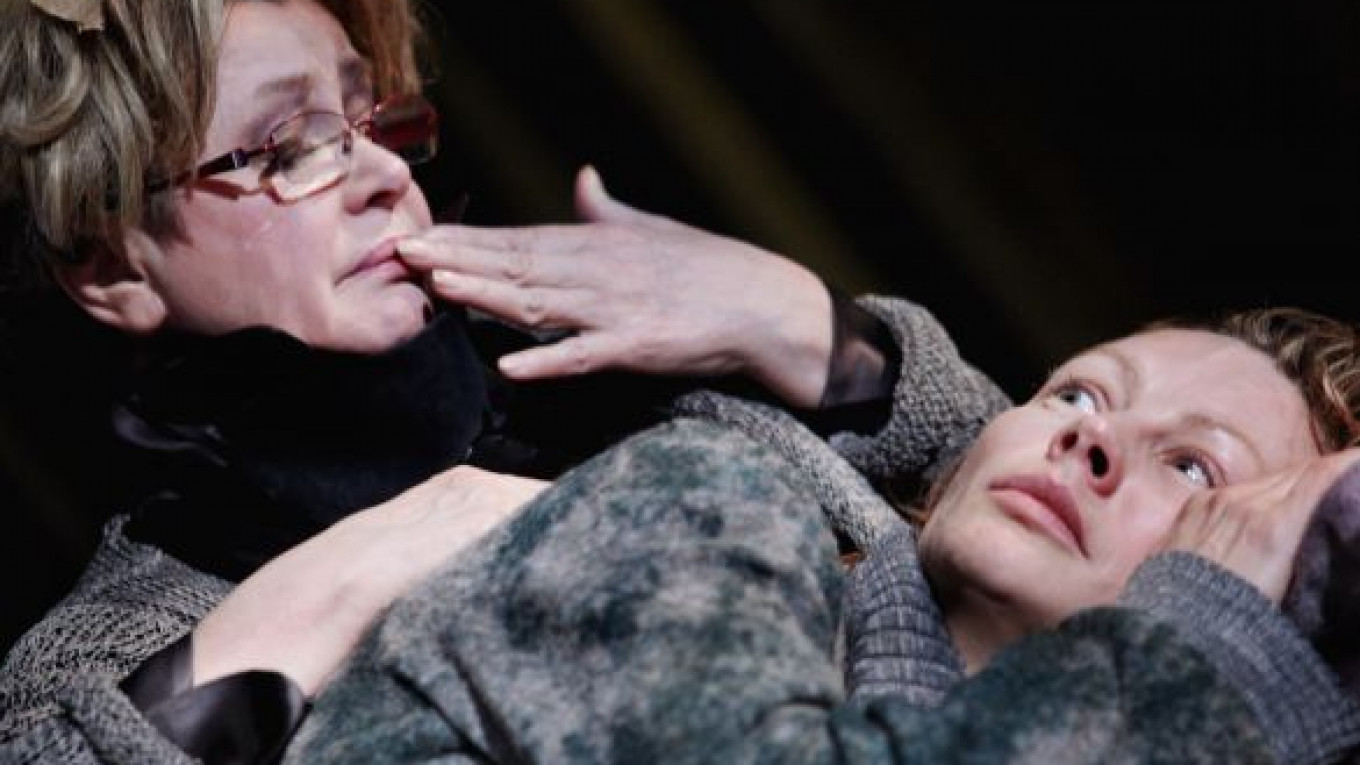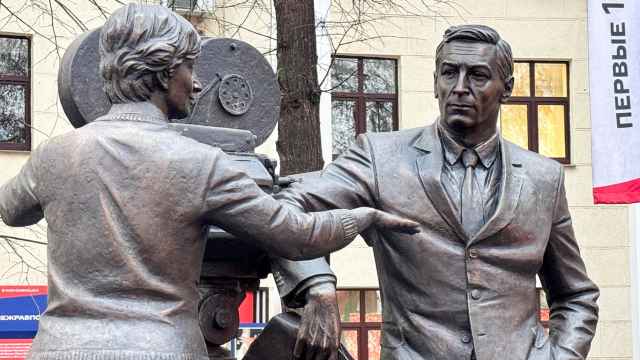Hell hath no fury like a woman scorned by another woman, especially if the two are mother and daughter.
That surely is one of the conclusions we can draw from the classic Ingmar Bergman film "Autumn Sonata." It is one of the truths that break loose repeatedly in Yekaterina Polovtseva's production of Bergman's script on stage at the Sovremennik Theater.
Things start slowly with some traditional — by which I mean to say cliched — scenes of exposé between Eva (Alyona Babenko) and her husband Viktor (Sergei Girin), a mild-mannered priest. Tinkly piano notes fall like autumn leaves behind the characters' sighing voices. She's a bit of a writer who hasn't seen her pianist mother in seven years; he is a quiet, supportive husband.
It seems to promise a snoozy tale about family relations. You couldn't be more wrong to fall for that.
Polovtseva provides the first hint that she is not playing by the usual theatrical rules during the entrance of Eva's mother Charlotte, played by the Sovremennik's leading lady Marina Neyolova. As Neyolova comes closer and closer to making her appearance — the coming event is telegraphed in several ways — you feel the audience gearing up for that adulatory ovation that often greets popular performers when they make their first entrance.
At least on the night I attended the show, it never happened. The actors and director wouldn't let it. The mother and daughter chattered like magpies as they pulled and tugged and dragged armloads of luggage across the stage, constantly tripping and turning and getting in each other's way. There wasn't room for applause. There was too much life transpiring on stage.
Polovtseva introduces other elements that move this performance away from the usual. Friends and lovers from the past — even a character from a book Charlotte reads — enter and make their presence known. The territory here may be dominated by Eva and Charlotte, but Eva's dead father Josef (Vladislav Fedchenko) and Charlotte's late trusted impresario Leonardo (Alexander Rapoport) are still very much a part of their lives. All of them move freely through walls, which, in Emil Kapelyush's design, are formed by loose-hanging slats in a cavernous wooden home.
This mother-daughter relationship has been seriously neglected. Eva, especially, built up serious resentments that she thinks warped her life. Charlotte committed some acts of which she is not exactly proud. One was to send her daughter Helena (Yelena Plaksina) to a nursing home when the girl's progressive illness incapacitated her. Charlotte is angry and humiliated when she learns that Eva rescued Helena from the hospital and now cares for her at home.
What emerges is a slow-burning confrontation that begins in the evening, heats up during the night and bursts into flames in the early hours of the morning.
Eva hurls a lifetime of frustration at her mother. She felt abandoned, unappreciated and unloved. She cannot forgive her mother for putting her career ahead of her family's happiness. Charlotte, in her turn, when reduced to tears and anguish, admits she always feared her daughter. She constantly searched for signs of affection that her daughter never offered.
I say nothing new by stating that Bergman wrote an extraordinary exposé of human relationships. But what is interesting at the Sovremennik is the way we see how everybody who feels shortchanged emotionally is wrong.
Eva's anger is so all-encompassing that it embraces her father, the one person who was always there for her in her youth. In Polovtseva's production, Josef looks on with a loving smile as Eva accuses him of being boring and weak. Charlotte is less understanding. Whatever her complex relationship with her husband may have been, she knew he was never anything less than smart and talented, and she lacerates her daughter for allowing herself such thoughts.
Always hanging over the painful confrontation is the fact that Eva has virtually no understanding of what it takes to be an artist. That it is no more apparent than when Charlotte tries to be polite about her daughter playing Chopin on the piano but only succeeds in offending her more.
We find we are watching two women battle their own demons, rather than those of the other. We also see how finely tuned, and how unlike anyone else every individual is. In the end, this take on "Autumn Sonata" is something of a hymn to variety in human types. The miracle is that sometimes even very different people still find their way into each other's embrace.
Neyolova and Babenko are superb in bringing that miracle to life.
"Autumn Sonata" (Osennyaya Sonata) plays Sun. and April 19 at the Sovremennik Theater, located at 19 Chistoprudny Bulvar. Metro Chistiye Prudy, Turgenevskaya. Tel. 621-6473. . Running time: 3 hours, 5 minutes.
A Message from The Moscow Times:
Dear readers,
We are facing unprecedented challenges. Russia's Prosecutor General's Office has designated The Moscow Times as an "undesirable" organization, criminalizing our work and putting our staff at risk of prosecution. This follows our earlier unjust labeling as a "foreign agent."
These actions are direct attempts to silence independent journalism in Russia. The authorities claim our work "discredits the decisions of the Russian leadership." We see things differently: we strive to provide accurate, unbiased reporting on Russia.
We, the journalists of The Moscow Times, refuse to be silenced. But to continue our work, we need your help.
Your support, no matter how small, makes a world of difference. If you can, please support us monthly starting from just $2. It's quick to set up, and every contribution makes a significant impact.
By supporting The Moscow Times, you're defending open, independent journalism in the face of repression. Thank you for standing with us.
Remind me later.







